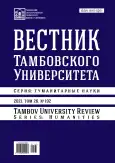Linguodidactic potential of educational computer games
- 作者: Shmelev B.A.1
-
隶属关系:
- Derzhavin Tambov State University
- 期: 卷 26, 编号 192 (2021)
- 页面: 58-69
- 栏目: THEORY AND METHODS OF FOREIGN LANGUAGE TEACHING
- URL: https://bakhtiniada.ru/1810-0201/article/view/298385
- DOI: https://doi.org/10.20310/1810-0201-2021-26-192-58-69
- ID: 298385
如何引用文章
全文:
详细
The definition of the concept of a computer game and the content of the parameters included in it are given. The types of computer games and how they are used for didactic purposes are considered. The main types of games include: design programs; dramatization (fairy tale constructors); developing computer programs aimed at developing visually-motor coordination in space; puzzles, games for the development of logical thinking; games for the development of attention and memory. The analysis of a number of advantages of computer games in the educational process is carried out. These include the following provisions: a large number of ways to provide information; a positive effect on the motivation and interest of students in the educational process; the variability of the ways in which the problems are solved, as well as control over their solution and formulation; a huge toolkit designed to control the activities of students; a beneficial effect on the development of introspection skills. We also consider the distribution of learning games according to different groups, depending on their nature of activity related to cognition. Game methodology and its basic principles are considered. The main principles are meaningfulness of learning; learning context; multivariance. The main suggestions for the proper use of computer games in the educational process are also considered. The main point will be the emergence of motivation to learn. Two fundamental principles of the motivation phase are also analyzed, which should be considered when choosing a computer game in the educational process. These include such principles of the phases of motivation as: research and culture. An analysis of how to use games, especially their educational part, to ensure a successful educational process is carried out.
作者简介
B. Shmelev
Derzhavin Tambov State University
编辑信件的主要联系方式.
Email: shmeliov.bogdan@yandex.ru
ORCID iD: 0000-0002-5233-135X
Assistant of Linguistics and Humanitarian and Pedagogical Education Department
33 Internatsionalnaya St., Tambov 392000, Russian Federation参考
- Juul J. The game, the player, the world: looking for a heart of gameness. Level Up: Digital Games Research Conference Proceedings. Utrecht, Utrecht University Publ., 2003, pp. 30-45.
- Mashbits E.I. Psikhologo-pedagogicheskiye problemy komp’yuterizatsii obucheniya [Psychological and Peda-gogical Problems of Computerization of Education]. Moscow, Pedagogika, 1988, 193 p. (In Russian).
- Gavrilova T.I., Timofeyeva N.M. Issledovaniye gotovnosti shkol’nikov k proyektirovaniyu razvivayushchikh komp’yuternykh igr [Study of the readiness of school student to design developing computer games]. Kontsept [Concept], 2014, no. 6, pp. 6-10. (In Russian).
- Maksimova N.A., Gavrilova T.I. Metodicheskiye osobennosti primeneniya razvivayushchikh komp’yuter-nykh igr v uchebnom protsesse [Methodic features of the use of educational computer games in the educational process]. Kontsept [Concept], 2015, no. 8, pp. 61-65. (In Russian).
- Maksimova N.A. Sistema formirovaniya tekhnologicheskoy kul’tury uchitelya [The system of formation of the teacher’s technological culture]. Sovremennyye problemy nauki i obrazovaniya [Modern Problems of Science and Education], 2013, no. 1, artcl. 266. (In Russian).
- Kremer O.B. Original’nyye komp’yuternyye igry kak sredstvo pedagogicheskoy kommunikatsii dlya realizatsii individualizirovannogo obucheniya v korrektsionnoy shkole 8-go vida [Original computer games as a means of pedagogical communication for the implementation of individualized learning in a correctional school of the 8th type]. Voprosy internet-obrazovaniya [Issues of Internet education], 2004, no. 20, pp. 54-58. (In Russian).
- Maksimova N.A. Metodicheskiye osobennosti izucheniya distsipliny «Audiovizual’nyye tekhnologii obucheniya informatike» [Methodic features of studying the discipline “Audiovisual Technologies of Teaching Informat-ics”]. Informatika i obrazovaniye [Informatics and Education], 2009, no. 3, pp. 97-99. (In Russian).
- Maksimova N.A. Osobennosti ispol’zovaniya informatsionno-obrazovatel’noy sredy v ramkakh inklyuzivnogo obucheniya [Features of the use of the information and educational environment in the framework of inclusive education]. Sovremennyye problemy nauki i obrazovaniya [Modern Problems of Science and Education], 2014, no. 4, artcl. 55. (In Russian).
- Egenfeldt-Nielsen S. Educational Potential of Computer Games. New York, Continuum Publ., 2007.
- Felicia P. Digital Games in Schools. A Handbook for Teachers. Brussels, European Schoolnet Publ., 2009.
- Lombardi I. Upgrading language teachers: language educators, techno-educators, edurectors? “Innovations in Technology-Mediated Language Learning”, CCERBAL Conference. Ottawa, University of Ottawa Publ., 2012.
- Gee J.P. What Video Games Have to Teach Us about Learning and Literacy. New York, Palgrave Macmillan Publ., 2007.
- Wertsch J.V. Voices of the Mind: A Sociocultural Approach to Mediated Action. Cambridge, Harvard Uni-versity Press, 1991.
- Papert S., Harel I. Constructionism. New York, Ablex Publishing Corporation, 1991.
- Huizinga J. Homo Ludens. Versuch einer Bestimmung des Spielelements der Kultur. Amsterdam, Pantheon Publ., 1939. (In German).
- Bruner J.S. Child’s Talk. Learning to Use Language. New York, W.W. Norton and Company Publ., 1983.
- Curran C.A. Counseling-Learning in Second Languages. Apple River Press, 1976.
- Asher J.J. The total physical response: theory and practice. Native Language and Foreign Language Acqui-sition. New York Academy of Sciences, 1997, pp. 324-331.
- Wilkins D.A. Notional Syllabus. Oxford, Oxford University Press, 1976.
- Krashen S.D. Principles and Practice in Second Language Acquisition. Oxford, Pergamon Press, 1982.
- Krashen S.D. The Input Hypothesis. London, Longman, 1985.
- Squire K. Replaying History. Learning World History through Playing Civilization III. Indianapolis, Indiana University Publ., 2004.
- Kelly M., Grenfell M. European Profile for Language Teacher Education: A Frame of Reference. Southampton, University of Southampton Publ., 2004.
补充文件









